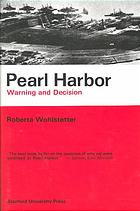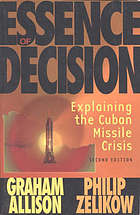Session 15
ORGANIZATIONAL CULTURE; PROs AND CONs
Organizational culture played key roles in two events of the 20th century, separated by 21 years. Watch both videos.
1941
"... the mechanism by which intelligence "signals" are sorted from background "noise" are neither uniform, entirely rational or random, but are instead functions of the culture and identity of the analytic unit"
1962
"... we are assuming governmental behavior can be most satisfactorily understood by analogy with the purposive acts of individuals ... it obscures the persistently neglected factor of bureaucracy; the 'maker' of government policy is not one calculating decisionmaker but is rather a conglomerate of large organizations and political actors ..."top
Two classic studies of the role of organizational culture in decision making

Read part of Roberta Wohlstetter's take on 1941
Wohlstetter, R. (1962).
Pearl Harbor; warning and decision.
Stanford, Calif: Stanford University Press
read pages vii-ix and 382-401
First of all, it is much easier after the event to sort the relevant from the irrelevant signals. After the event, of course, signal is always crystal clear; we can now see what disaster it was signalling, since the disaster has occurred. But before the event it is obscure and pregnant with conflicting meanings.

Read part of Graham Allison's take on 1962
Allison, G. T. (1971).
Essence of decision: Explaining the Cuban missile crisis.
Boston: Little, Brown
read pages v-viii;
skim pages 10-38, 87-100, 144-184;
read pages 245-263; and
skim pages 264-277
For explaining and predicting the behavior of individual men, this general orientation toward purpose and rational choice seems to be the best available. The rationality of man's choices is, of course, "bounded" by things such as the availability of information and the difficulty of calculation. But as a baseline, if one knows how an individual has defined his problem and what resources he has available, his objectives provide a good clue to his behavior.top
Difficulties arise when the thing to be explained is not the behavior of an individual but rather the behavior of a large organization or even a government.
You don't have to read these unless you wish to, but we might touch upon them in conversation
Read Saving 'Boxer 22' and compare the story there to The Rescue of Roger Locher.
Is there anything to learn about how organizational memories are born and transmitted? Do you think the first story affected the second?
topTHINGS WE'LL TALK ABOUT
- using Wohlstetter and Allison as examples, we'll reflect on the benefits and disadvantages of organizational culture
- why is an organizational culture necessary?
- does it help organizations orient their goals and prioritize?
- does it make organizations vulnerable to stagnation?
- think of companies and organizations that refused to change their organizational culture and suffered as a result
 top
top
SOMETHING TO TAKE AWAY
La Mer
"La Mer" (English: "The Sea") is a song credited to French composer, lyricist, singer and showman Charles Trenet. The song was first recorded by the French singer Roland Gerbeau in 1945. It was not until 1946 that Trenet recorded his own version. When it was released in 1946, it became an unexpected hit, and has remained a chanson classic and jazz standard ever since.
